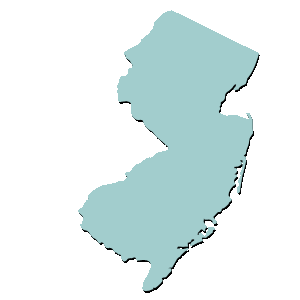New Jersey Retirement

Retirees in New Jersey face some of the highest tax rates in the nation. The maximum income tax rate in the Garden State is 8.97%.
» Speak to a New Jersey Retirement Advisor for Free
Income Taxes in New Jersey
New Jersey has a graduated or progressive income tax. This means the rate of taxation increases with the amount of income earned. The tax rates are easy to determine with the Simple Rate Tables and Schedules published by the State Treasury Department.
New Jersey charges the same rate of taxation regardless of filing status. This means that the tax rate is based solely upon income. A married couple with an income of $100,000 a year and a single man with a yearly income of $100,000 would pay the same state tax rate in New Jersey.
Persons and couples with an income of less than $20,000 a year do not have to pay state income tax in New Jersey. Filers with an income of $20,000-$35,000 a year pay a rate of 1.75%. Those with a yearly income of $35,000-$40,000 pay a rate of 3.5%. Those with an income of $40,000-$75,000 a year pay a rate of 5.525%. Those with an annual income of $75,000-$500,000 pay a rate of 6.37%. And those with yearly incomes over $500,000 pay a rate of 8.97% a year.
The state of New Jersey has the ability to change income tax rates to deal with changing circumstances. The top tax rate was raised in 2010 to help cover a state budget shortfall.
New Jersey Inheritance Tax
The state of New Jersey charges Inheritance and Estate Taxes. The amount of these taxes is based upon the federal estate tax paid. This means that an inheritance tax form will have to be filed for every estate in New Jersey. Heirs can limit the amount of tax due by applying for a protective claim with the New Jersey Treasury Department.
New Jersey Capital Gains Tax
There is a Capital Gains Tax in New Jersey that applies to many transactions including stock sales, real estate sales, and gambling winnings. The capital gains tax rate in New Jersey in 2010 was 8.97%. Tax-exempt investments such as treasury bonds would not be affected by this tax. Money earned from the sale of tax-deferred investments such as annuities could be regarded as a capital gain.
New Jersey Sales Tax
The State of New Jersey charges a Sales and Use Tax at a rate of 7%. Purchases of prescription drugs, some non-prescription drugs, uncooked food purchased from grocery stores, real estate, medical equipment, and vehicle fuel are not covered by the New Jersey sales tax. That said, other taxes may be collected on some of these items in New Jersey.
New Jersey Property Taxes
Property tax rates in New Jersey are set by county, city, and town governments based upon the assessed value of the property. Property owners will have to contact their County Assessor or tax administrator to determine what the property tax rate is. A variety of Property Tax Relief Programs are available for homeowners in New Jersey. Property tax forms and information about the property tax are available from the New Jersey State Treasury Department.
Taxes on Pensions, IRAs, and Annuities in New Jersey
Almost all pensions, including Federal and state government pensions, are taxable in New Jersey. Payments and withdrawals from annuities and most IRAs may also be taxable in New Jersey. The rate of taxation would likely be the individual's state income tax rate. Such investments could also be subject to New Jersey's capital gains tax. That means all retirement income must be reported on state tax returns in New Jersey. Income earned from retirement investments in other states is taxable in New Jersey and must be reported on your state tax return as well.

| Capital: | Trenton |
| Cost of Living Rank: | #46 |
| Sales Tax: | 7.0% |
| Income Tax: | 1.4% - 8.97% |
| State Website: | http://www.state.nj.us |